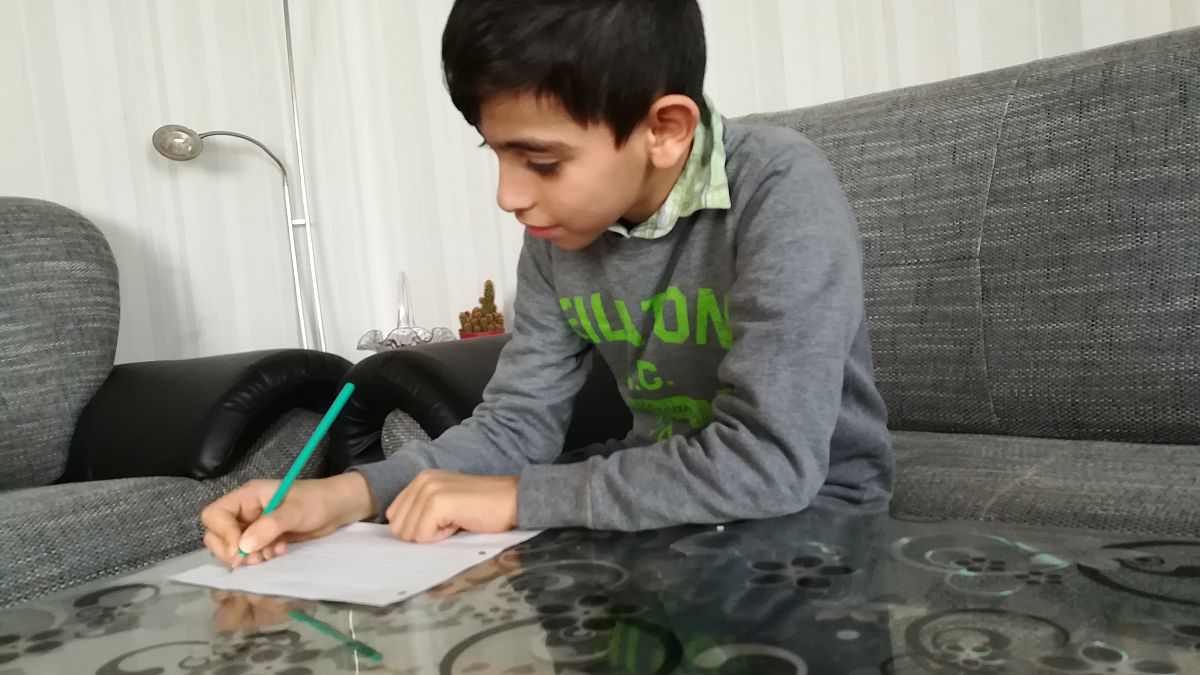Four Syrian children have penned letters recalling their memories of the war that has torn apart their homes, their perilous journeys to Europe, and looking forward to their hopes for the future.
When Osama’s dad made the “journey of death” across the Mediterranean two and a half years ago he promised his son that he would stay alive.
The family had fled the war besieging their native Syria by crossing the border to Turkey, and dreamed of rebuilding their lives in Europe.
Osama, now 10, says he “suffered a lot of fear and worry” as his dad and older siblings made the perilous sea crossing.
“My father promised me that he will stay alive, that he will reach the other side and that he will see me again,” he wrote in a recent letter.
His father stayed true to his word and a few months later, Osama, his mother and three sisters followed their loved ones to Europe where they were reunited.
Now living together again in a small town close to the German city of Münster, Osama is enjoying being back in school and playing with new friends.
But while he says he is happy in Germany, his home in Syria is constantly on his mind.
“I miss my friends, my teachers, my toys and even my photos, which I could not bring with me,” he explained.
“Here in Germany, we are offered the best educational chances, however, I am still a refugee and this word hurts me. It causes me a wound that reminds me of my bigger scar; Syria in which up until this moment, children’s body parts are falling under the ruins of buildings.”
Osama’s story is echoed by hundreds of thousands of children, whose families have fled their homes in search of safety in Europe.
According to figures from Eurostat, some 346,260 Syrian children applied for asylum in EU countries between 2011 and December 2017.
Laurent Chapuis, UNICEF’s Regional Adviser on Migration, told Euronews that children asylum seekers often struggle with anxiety and depression as they struggle with uncertainty about their status and being reunited with their families.
“The war has exposed those kids to situations they should never have been exposed to,” Chapuis said, explaining that children fleeing wars are “forced to grow up very fast.”
But, he said, children “are very strong, very resilient.”
Azhar had almost finished her studies when fighting forced the closure of her school in the border city of Kobani.
“I travelled to Aleppo to take part in the end of year exams. I studied in the daytime and listened to bombs at night,” she recalled.
After completing her exams, she was travelling home on the bus when it was stopped by ISIS fighters.
Girls were allowed to continue their journeys while the boys were taken away.
“I never heard what happened to them,” she said.
As the conflict continued to escalate, Azhar’s family decided to flee Syria, hoping to reach Germany where they had close relatives.
Packing her diploma, the keen student made the dangerous journey to Europe, but her family’s dreams of reaching Germany were not realised.
For more than two and a half years, Azhar has been living in Greece’s Skaramangas Refugee Camp.
“Sometimes I feel trapped. But in my books, my studies, I can feel freedom,” she said.
“I’ve lost so much time. There is so much I want to do, but I can’t do it here. I wake up in Skaramangas camp every morning, I see six people in our tiny room, and I think: ‘I need to make this situation better. I have to fight, and every day I fight to improve.’”
Now 18, Azhar works with volunteers in the camp to teach young children there Arabic, maths and English.
“The sense of being needed gives me purpose and hope. It gives me a way to forget about our situation,” she said.
“I want to fix the things that are wrong. I want to be a leader to help people who need help all over the world, and help the women who are oppressed.”
*Letters were supplied to Euronews by UNICEF
